
In addition to the newly revised Classical Languages major, starting in Fall 2021 we now also offer a variety of integrated majors that combine the study of classical languages with other related fields. Check out the descriptions for each of these major options below. For complete information on courses please reference the 2021-2022 college catalog.
A departmental honors program is an option for the Classical Languages major. To graduate with honors, the student must complete 4 hours of upper-division work in the language of concentration beyond the 4 required of regular majors and another 4 hrs in any upper-division HEBR, GREK, or LATN class or any other departmentally approved ancient language course (e.g., Akkadian, Aramaic, Ugaritic). Upon selection, these courses are to be designated as “honors work.” “Honors work” means that a student’s work goes beyond that of the class’s other students, in quality if not quantity. These hours count toward the major and are usually taken in the senior year. The student will also take CLAL 499 (honors thesis). Minimum acceptable grade in honors work is A-. The departmental honors designation will appear on a student's transcript and on the printed program at graduation. A copy of the thesis will be kept in the college library.
Students majoring in Classical Languages who are interested in pursuing departmental honors should discuss this interest with their advisor, preferably during their junior year.
- The student must have an overall GPA of 3.5 or above.
- The student must have a GPA in the major of 3.7 or above.
- The student must apply for departmental honors at least 1 academic year prior to the anticipated graduation.
- To graduate with honors, the student must complete 4 hours of upper-division work in the language of concentration beyond the 4 required of regular majors and another 4 hours in any upper-division HEBR, GREK, or LATN class or any other departmentally approved ancient language course (e.g., Akkadian, Aramaic, Ugaritic). Upon selection, these courses are to be designated as “honors work.” “Honors work” means that a student’s work goes beyond that of the class’s other students, in quality if not These hours count toward the major and are usually taken in the senior year. The student will also take CLAL 499 (honors thesis). The minimum acceptable grade in honors work is A-.
- The student’s application should also identify the professor who has agreed to serve as the director of the honors thesis. The student must discuss the thesis idea with her or his advisor and the proposed thesis director prior to completing the application.
- The MCL chair and proposed thesis director, in consultation with the student’s advisor, must review and sign the application in order for the student to be admitted to candidacy for departmental honors.
- The student must write a proposal for the honors thesis, including an outline of the argument and substantive bibliography, to be approved by thesis director.
- Ordinarily the thesis proposal should be approved by the end of fall semester of the student’s senior year.
- Ordinarily the honors thesis should be 40-60 pages.
- Once the proposal is accepted, the student can register for 4 hours of CLAL 499.
- The final draft of honors thesis should be approved by the thesis director and by another member of the Classical Languages section.
- The student’s grade will be decided by the thesis director. The minimum acceptable grade is A-.
- Departmental honors designation will appear on the student’s transcript and on the printed Commencement A copy of the thesis will be kept in the college library.
From the Wheaton College Catalog 2020-2021: Some departments offer departmental honors recognition for high-achieving students within their major(s). Students wishing to pursue departmental honors must achieve the following minimum criteria:
- A minimum cumulative GPA of 3.50
- A minimum major GPA of 3.70
- Complete an application in the department for the honors program during the student’s junior year.
- Complete 4-8 hours of courses designated as honors courses including an honors research/thesis project (course number 499). Most departments will also require an oral defense.
The pursuit of departmental honors is at the discretion of the department and additional requirements may be imposed at the discretion of the department. Students interested in pursuing departmental honors should speak with the chair of their major department. Students who begin an honors thesis but do not qualify for departmental honors upon its completion may appeal via Academic Petition to have the thesis converted to an independent study. Students successfully completing all requirements for departmental honors will have the award noted on their transcript. In order for department honors to be included in the commencement program, the oral defense/thesis must be completed by April 15, and verification received by the Registrar’s Office from the department by April 25.
Classical Languages Majors
Within the Classical Languages major you will have the opportunity to read and work with original-language texts of the Jewish, Classical, and Christian traditions. In addition to mastering the languages, you will learn to grasp challenging concepts, to ask significant questions and to seek answers to them, to develop original ideas, to become intellectually self-motivated, and to give great attention to accuracy in the use and interpretation of your languages.
You can begin the Classical Languages major as late as the fall of your junior year. This major is an attractive option even if you have no prior knowledge of the classical and biblical languages, but you are on track for graduate work in Classics, Biblical Studies, Early Christian Studies, or ministry. Many of our alumni have gone on to work in education, medicine, law, business, the military, the home, and other fields.
As a student of this major, you will achieve intermediate competency in two of the major’s languages (Hebrew, Greek, Latin) and concentrate in one of the two selected languages through 4 hrs of upper-division work, plus the capstone course.
Students with intermediate knowledge in Latin, Greek, or Hebrew prior to matriculation that is not departmentally approved transfer credit may, upon departmental approval, substitute for those 12 core hours any 12 hours of GREK, HEBR, or LATN course work, or any other departmentally approved hours.
Students who desire a still deeper grounding in the languages are encouraged to pursue an honors designation in Classical Languages. Read on, in the next tab, about the Classical Languages Honors Program for more detail.
Along with specific requirements for any major, all students in the Bachelor of Arts and Bachelor of Science degree programs must meet all general education and graduation requirements under a single catalog.
|
Major requirement = 32 hrs1 |
|||
|
Core: Complete the 101-201 sequence in two of the following languages equaling 24 hours2 |
|||
|
HEBR 101, 102, 2013 |
Elementary Hebrew I-II, Intermediate Hebrew |
12 hrs |
|
|
GREK 101, 102, 2013 |
Elementary Greek I-II, Intermediate Greek |
12 hrs |
|
|
LATN 101, 102, 2013 |
Elementary Latin I-II, Intermediate Latin |
12 hrs |
|
|
Concentration: Select 4 upper-division HEBR or GREK or LATN hrs from 3xx-4xx3 |
4 hrs |
||
|
CLAL 494 |
Capstone |
4 hrs |
|
|
|
|
||
1 This major configuration fulfills only 8 of the 36 upper-division hours required of all students to graduate.
2 At least 4 of the 32 CL hours must be HEBR, GREK, or LATN upper-division (300-400 level). Students with beginning to intermediate knowledge of one of these classical languages prior to matriculation may, upon obtaining departmental approval, substitute for those hours the equivalent number of hours in any other HEBR/GREK/LATN courses for a total of 32 Classical Languages hours.
3 All completed in residence.
The Classical Languages minor requires 20 hours of HEBR, GREK, or LATN including at least 8 hours of upper-division course work in one of the three languages (all completed in residence). Senior Seminar is not required for the minor.

Classical Languages Integrated Majors
Since most of Wheaton College’s curriculum has roots in the classical world or in some other way supplements the study and dissemination of the classical languages, and since the combined study of the classical languages and other fields is mutually supporting, the department offers several Integrated Majors that allow students to complete the major by taking 24 hours of required classical languages courses—including within those 24 hrs the beginning sequence of 101, 102, 201—and 16 hours of designated courses in some companion discipline. Integrative majors may thus combine a solid grounding in one of the classical languages (Hebrew, Greek, or Latin) and substantial course work in biblical and theological studies, philosophy, art, English, or some other discipline to earn a classical languages degree. The integrated major allows students to pursue both interests simultaneously. 12 of the 16 hours of the companion discipline can also count toward a second major.
 The pairing of Hebrew, Greek, and/or Latin with the study of art history allows you to grapple with both halves of the evidence from the ancient and pre-modern world. Ancient languages and texts provide a glimpse into the world of the ancients and give context for understanding art, both ancient and modern; meanwhile, the study of art provides real, concrete material that connects us directly with the past. In addition, European art draws heavily on the classical cultures of Greece and Rome. If you love studying history, art, and languages, this is the perfect major for you.
The pairing of Hebrew, Greek, and/or Latin with the study of art history allows you to grapple with both halves of the evidence from the ancient and pre-modern world. Ancient languages and texts provide a glimpse into the world of the ancients and give context for understanding art, both ancient and modern; meanwhile, the study of art provides real, concrete material that connects us directly with the past. In addition, European art draws heavily on the classical cultures of Greece and Rome. If you love studying history, art, and languages, this is the perfect major for you.
 If you're interested in public speaking, debate, and rhetoric, this integrated major is for you. Public speaking and debate training, along with study of contemporary critical and theoretical sensibilities, will give you practical insight and a strengthened interpretive “feel” for reading ancient orators and theorists. This “feel” is a vital part of the training you'll need if you want to become a scholar interpreting ancient oratory and theory. Conversely, as a student and practitioner of modern rhetoric, you will learn a great deal from the ancient handbooks and models, which are best accessed in their original languages and contexts.
If you're interested in public speaking, debate, and rhetoric, this integrated major is for you. Public speaking and debate training, along with study of contemporary critical and theoretical sensibilities, will give you practical insight and a strengthened interpretive “feel” for reading ancient orators and theorists. This “feel” is a vital part of the training you'll need if you want to become a scholar interpreting ancient oratory and theory. Conversely, as a student and practitioner of modern rhetoric, you will learn a great deal from the ancient handbooks and models, which are best accessed in their original languages and contexts.
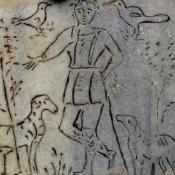 This major is an excellent choice if you're interested in studying theology and/or the history of the early church. A foundation in Greek and/or Latin is both a natural complement and a catalyst to all serious study of early Christianity, as well as a key component of broader theological and historical studies. Early Christianity formed part of the cultural world within which the classical languages evolved.
This major is an excellent choice if you're interested in studying theology and/or the history of the early church. A foundation in Greek and/or Latin is both a natural complement and a catalyst to all serious study of early Christianity, as well as a key component of broader theological and historical studies. Early Christianity formed part of the cultural world within which the classical languages evolved.
With this integrated major, your classical language studies will combine fluidly with the Early Christian Studies Certificate program, and can also be applied toward a major in Biblical and Theological Studies.
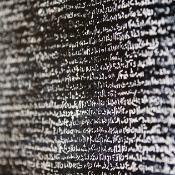 If you love languages and have an interest in teaching, this major is for you. The study of linguistics is a natural complement to all language learning, use, and instruction, and many students of the classical languages aspire to a career in primary or secondary education. Even if you don't teach one of the classical languages, the coursework will enhance your resume.
If you love languages and have an interest in teaching, this major is for you. The study of linguistics is a natural complement to all language learning, use, and instruction, and many students of the classical languages aspire to a career in primary or secondary education. Even if you don't teach one of the classical languages, the coursework will enhance your resume.
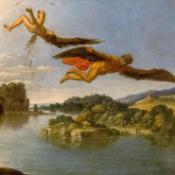 The classical languages will give you unmediated access to the seminal texts of the 2800-year Western literary tradition. They provide a natural complement to the study of English literature, which, especially in its earlier texts, grew up in the tradition of forms, styles, and subjects of literature written in Hebrew, Latin, and Greek.
The classical languages will give you unmediated access to the seminal texts of the 2800-year Western literary tradition. They provide a natural complement to the study of English literature, which, especially in its earlier texts, grew up in the tradition of forms, styles, and subjects of literature written in Hebrew, Latin, and Greek.
With this in mind, the English courses in this integrated major are concentrated on texts and authors that are more closely connected to the classical legacy. The integrated major would also be a good fit if you're interested in medieval, Renaissance, or early modern studies.
 If you love learning languages, this major is for you. You will learn the history of both ancient and modern languages, as well as their linguistic similarities and differences. If you're planning to attend graduate school, future research interests may require both ancient and modern languages. And whether you plan to pursue a career in business, finance, medicine, law, international relations, politics, or many other fields, study of modern and classical languages will be a significant enhancement to your resume.
If you love learning languages, this major is for you. You will learn the history of both ancient and modern languages, as well as their linguistic similarities and differences. If you're planning to attend graduate school, future research interests may require both ancient and modern languages. And whether you plan to pursue a career in business, finance, medicine, law, international relations, politics, or many other fields, study of modern and classical languages will be a significant enhancement to your resume.
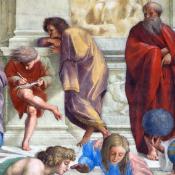 This integrated major is ideal if you're also interested in studying philosophy. The discipline of philosophy has its roots in Greek and Roman thought, and those who study philosophy find knowledge of the classical languages extremely useful as they interpret the works of those early Greco-Roman philosophers. This integrated major would also provide a strong complementary foundation if you are pursuing an education in contemporary analytic or continental philosophy.
This integrated major is ideal if you're also interested in studying philosophy. The discipline of philosophy has its roots in Greek and Roman thought, and those who study philosophy find knowledge of the classical languages extremely useful as they interpret the works of those early Greco-Roman philosophers. This integrated major would also provide a strong complementary foundation if you are pursuing an education in contemporary analytic or continental philosophy.
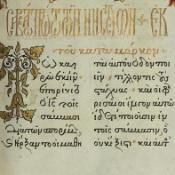 The Biblical and Theological Studies courses selected for this integrated major bear on the history, culture, and literature of ancient Greek, and the study of Greek facilitates greater depth of work in the field of biblical and theological studies. This major will be an attractive option if you plan to advance to graduate work or directly into ministry, but the original language work is of more a supplement than your primary interest.
The Biblical and Theological Studies courses selected for this integrated major bear on the history, culture, and literature of ancient Greek, and the study of Greek facilitates greater depth of work in the field of biblical and theological studies. This major will be an attractive option if you plan to advance to graduate work or directly into ministry, but the original language work is of more a supplement than your primary interest.
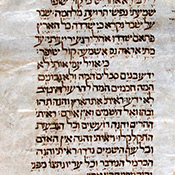 This major is designed for students who wish to study the Bible in the original languages. It is ideal if you are planning to advance to graduate studies or directly into vocational ministry and wish to begin original-language study immediately, rather than deferring it to graduate school (as is often required as the de facto result of limited undergraduate offerings in Hebrew and Greek). This major will also prepare you well for careers in editing, publishing, Bible translation, and education.
This major is designed for students who wish to study the Bible in the original languages. It is ideal if you are planning to advance to graduate studies or directly into vocational ministry and wish to begin original-language study immediately, rather than deferring it to graduate school (as is often required as the de facto result of limited undergraduate offerings in Hebrew and Greek). This major will also prepare you well for careers in editing, publishing, Bible translation, and education.
 This integrated major is an option, in exceptional cases only, if you want to integrate your field of study with the classical languages major, but your field of interest is not represented by the other pre-existing integrated programs. This program can provide a special opportunity for new programs of study in which you would collaborate with your advisor and the CL language section coordinator (with department chair oversight) to create a unique and rich path of study.
This integrated major is an option, in exceptional cases only, if you want to integrate your field of study with the classical languages major, but your field of interest is not represented by the other pre-existing integrated programs. This program can provide a special opportunity for new programs of study in which you would collaborate with your advisor and the CL language section coordinator (with department chair oversight) to create a unique and rich path of study.
"My ancient languages major has been one of my biggest professional and ministerial advantages. . . . Today, as a missionary scholar I am constantly grateful for the way my ancient languages degree enriches my theology, preaching, and teaching."
- Dr. Christopher M. Hays '04, Profesor de Nuevo Testamento, Fundacion Universitaria Seminario Biblico de Colombia
Take the Next Step
Request InformationApply Today

